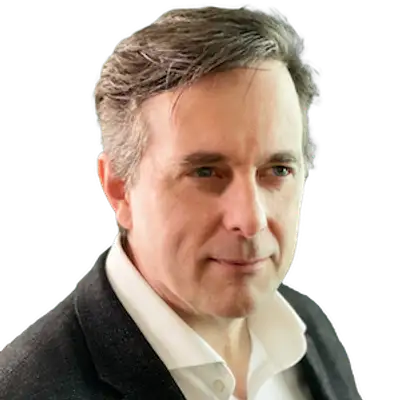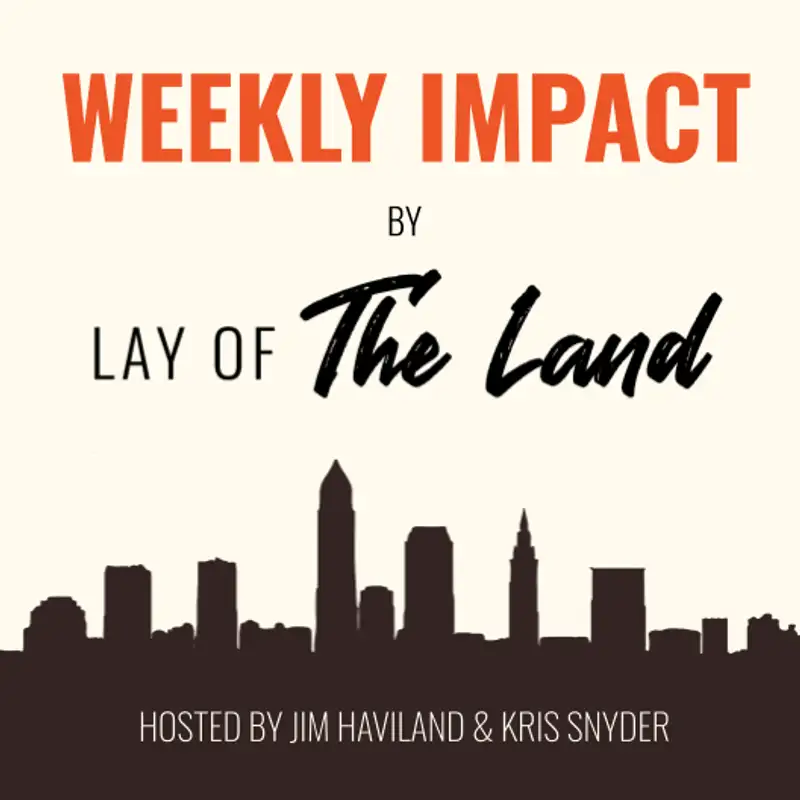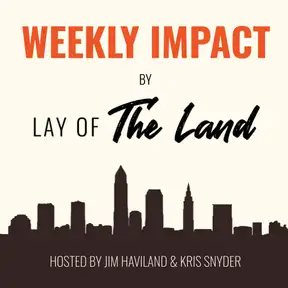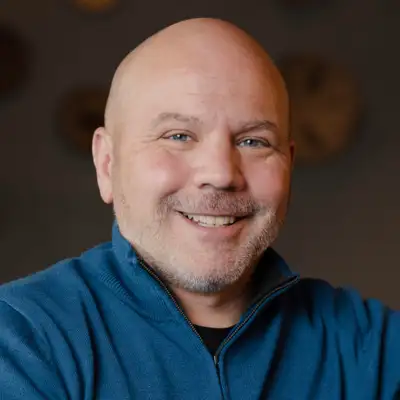9-9-24 Dan Nitowsky, Tiger 21, Peer Groups, VC Fest
Jim Haviland (00:01.506)
Hello everyone. This is Jim Haviland. I'm sorry. Sorry, Kris I caught you off guard again because I wasn't looking at my notes. This is Weekly Impact. Today is the, gosh, it's the 9th of September, Kris. We're well into September now, 9 -9 -24. And we've got a great show to talk about today. Dan Nikowsky, Tiger 21. And this is an interesting story because it talks about peer groups, but also part of the story we don't normally talk about.
Kris Snyder (00:04.992)
I'm Kris Snyder.
Kris Snyder (00:32.004)
Yeah, because it's kind of like what happens in your entrepreneurial journey when you've exited, right? And so much of the time and focus, the building value in your business and people dream of the liquidity event. It's almost kind like lottery ish, right? That ACH transfer will come someday maybe. And then it happens. And that's where Dan and Tiger 21 come in.
Jim Haviland (00:51.53)
Now what? Yeah. And I know Kris, this is something too, that's becoming more and more of an issue. I know with your work with EPI that you guys, that people are planning to exit sooner. They aren't like, I'm going to do this for the rest of my life and then I'm going to retire. They are thinking about having this business for a period of time so they can exit and they'll do something different. That's part of the model now, right?
Kris Snyder (01:12.804)
Yeah, because it's not just about, I think generationally, we saw where people were going to hang on to that business up until retirement and there was no 2 .0, right? And I think even Dan, referring to himself in this episode was talking about his 2 .0 when he, you know, retired and then figured out that he was too young, too early and needed to do something else. And that's when he, that's right. And so that's when he went back into, you know, the Vistage worldish and then obviously ended up in doing this Tiger 21 bit, but
Jim Haviland (01:22.251)
Yes.
Jim Haviland (01:33.418)
How much golf can you play? Right. Yeah.
Kris Snyder (01:42.276)
You know, I think personally, even for me, Jim, as we talk about like first act, second act, third act, Jane Fonda made it really popular, wrote a book about it, right? And your acts kind of come in like 30 year terms, right? And while I'm not to my third act yet, you know, my wife and I are actively planning on for that third act and all the things that personal, professional that you'd start to consider. And I think this is really interesting because Tiger 21 is a peer group that helps people, whether it's their third act or their 2 .0, however you want to think about it when they're
Jim Haviland (01:50.966)
Got the Yep.
Kris Snyder (02:11.214)
when they're ready and they have that kind of liquidity event, now what do you do for support?
Jim Haviland (02:16.256)
Yeah, and I think that's because you've got all the options, right? You've got you've got it's now it's maybe a little bit even more complicated because, you know, am I going to do something else or am I just going to relax? And maybe a combination of the two. I mean, we've seen this with some of our peers, some of our friends. I you're your group that you work with, you know, from EO, a lot of these guys have exited. And now what? And they all have different answers.
Kris Snyder (02:40.526)
Yeah, it's, know, identity might be too strong to say, but I think there is something there when, and it's not just the individual, I think it's also the spouse that gets kind of caught into this because a lot of they were support mechanism or maybe they're in the business or maybe it was just kind of like now that person's home and they weren't home before, what am I gonna do, right? right, we can't be in the house like.
Jim Haviland (02:45.206)
Yeah
Jim Haviland (02:54.433)
Yeah.
Jim Haviland (03:02.434)
You're messing with me. Get out of here. What are you doing? Yeah. You're making it, taking up space.
Kris Snyder (03:09.902)
That's right, it can't be in the house that much.
Jim Haviland (03:12.45)
Well, when this goes back to that story I used to tell about, you know, I was in Seattle during the dot bomb and, you know, I was part one of 60 ,000 internet executives that got laid off in a matter of a month, month and a half, something like that. And, and we went for counseling as part of our unemployment. they said, you know, listen, in America, when you go to a party, the first thing people ask you is what do you do? And if it's nothing, you've got nothing to talk about. And
And I reflected, know, the other part of the story was in Seattle during the nineties, thing was, I asked, what are you working on? Which is still my favorite. And I think you've started adopting it too, right? Personally, we go to the lay of the land events. It's, what we do. We ask, what are you working on? Cause that's the most interesting question you can answer.
Kris Snyder (03:55.468)
Yeah, well, and I think that that's a great way to think about it. It's what you're working on or what are you working towards and for. you know, Jeffrey had a line that, actually, I don't know, I've heard him use before, but he talked about purpose, plan and platform. And so your purpose is tied up in your business, the plan that you have, you're executing towards, and then your business is really your platform. And it's your social currency moment. It's like when you're at whatever, you know, social situation, cocktail party, dinner, whatever.
Jim Haviland (04:02.038)
Yes.
Jim Haviland (04:08.971)
Yes.
Jim Haviland (04:16.873)
Right.
Kris Snyder (04:24.918)
and someone is your distribution point of view. And that's the platform side. And even reputationally, I've watched folks who, including myself, when you exit your business and those folks in your network, they'll respond to you the same way because you don't have the platform you used to have, right?
Jim Haviland (04:41.224)
Right. Exactly. Exactly. I mean, it's like, I don't why would I talk to this guy? What does he, know, you know, it just you kind of and it's just not because they don't like you. It's because, know, I've got I've got a filter. And if I don't have a good reason to to talk to you, then maybe I don't. If it's not clear to me.
Kris Snyder (04:57.476)
Yeah. And I also thought, yeah, and Dan did a nice job of talking about these peer groups, the entrepreneurs organization, EO, a young president's organization, YPO, obviously Vistage, because he was a Vistage chair. And then saying that, you know, there's some kind of linear motion across these, like you start at a certain place, maybe you can get into YPO or, know, Vistage is a different place. But he was calling 20 year 21 really a graduate school for these other peer groups, which I thought was an interesting thing.
Jim Haviland (05:04.382)
Yep.
Jim Haviland (05:22.618)
Right. Well, he left out elementary school, which is the B and I chapters. I think it's but but the point is that everyone deserves and needs and benefits from having peers that they can talk to and to work through what they're going through. And the same jelly jar that they are in the same boiling water that they are. that's, know, you can say things to them, but you can't say to other people. know that's way leading to that pretty heavy that there's a
you know, a way of talking about things, a 5 % concept.
Kris Snyder (05:55.0)
Yeah, and you're supposed to think about this group, your peer group as your board of advisors, right? Like he was pretty good about saying, hey, these are not financial planners. They're not like, they're not, at that's still how you shouldn't treat them, right? They might be their previous occupation, but in that moment, that's not how you're, you should go have those professionals in your life, but this is more of an experienced peer group that's going to share what they did, how they faced with, you know, whatever you're facing now and really be that sounding board as you're trying to navigate.
Jim Haviland (06:04.096)
Right.
Jim Haviland (06:08.224)
Right.
Kris Snyder (06:22.788)
And for Tiger 21, was a lot he was talking about was wealth preservation. And these other peer groups, it's about wealth generation, right? And then that's that next stage. I mean, it's a pretty high bar. was kind of, I didn't know that what the bar would be, but 20 million investable assets. mean, because that means that you've exited pretty well, because you also had tax coming out of there and everything else, right? Like that's not, that's not what I was, no, it's.
Jim Haviland (06:27.713)
Right.
Yes.
Jim Haviland (06:46.434)
Right, right. Yeah, yeah, there's that that wouldn't be everybody. That wouldn't be everybody. Right. So because I know that like even with EO, you can stay in the EO for a long time. They actually have a campaign running where they're trying to get people who have exited their business to stay in EO in some way, because they haven't got the 20 million. They have nowhere else to go. And having that community is still an important part of of being alive.
Kris Snyder (07:09.966)
Well, he also went down the path of, dealt with this going back to Malley's chocolate episode, right? Where first generation is often the wealth creators, second generation starts to decline potentially and the third generation is really kind of exit either completely out or collapse. And he was talking about that is like, so some of these folks have even sold their business, but they maybe didn't sell the whole thing. They sold a piece of the private equity or whatnot. And now they've got this transition. Maybe their kids are still in it or like,
Jim Haviland (07:15.948)
Yeah.
Yes.
Jim Haviland (07:36.928)
Yeah.
Kris Snyder (07:38.665)
My kids aren't in it, but I'm trying to figure out how to help my kids not be a -holes right now that they know who well.
Jim Haviland (07:43.402)
Yeah. And how to maintain not only the business, but the culture, the core values. mean, we talked about the importance of all those things. And it's interesting. We maybe need a peer group for that because we've had Mike Malley, we had Mary Common from NCS. She's preparing the third. She's the second generation preparing the third generation. And then we had Riley Burke, second generation, but like being very intentional about I'm trying to put my stamp on it.
but advance it and expand it. And I think the opportunity is there, but it doesn't happen very often.
Kris Snyder (08:19.14)
Yeah, Jim, just to sum this one up and I, you know, I felt like, gosh, I need to reach out to Dan to get to know him a little bit better because I didn't, I didn't feel his story. Like I think I learned a lot about Tiger 21 in this episode, which was awesome and greatly appreciated. But I also, one of the things I love about the podcast, I feel like I get to know the entrepreneur a little bit more and or the person who's supporting entrepreneur, which I kind of put Dan in that category with his Tiger 21, group, but definitely want to reach out to Dan and get to a little, a little bit better.
Jim Haviland (08:30.668)
Fair statement. Yeah.
Kris Snyder (08:48.9)
coming out of this.
Jim Haviland (08:49.27)
I think that's right, because we can't make recommendations to them until we know them little bit better. We want to make those a perlative recommendations, right? But the real takeaway here is you've got to have a peer network. There's plenty of them out there to pick from, including putting them together. So you've got a former EO group that you work with.
Kris Snyder (08:54.37)
Yeah.
Kris Snyder (09:08.484)
Yeah, so I mean, we kind of just aged out, right? So I was in EO for 13 years in our forum, as they call them. I just got to a place after a decade together inside, we kind of exited and we just kept, call it the 5 % forum and there's eight of us and we've been doing this now outside of EO for four or five years. Nothing wrong in my opinion with that, because I think it's just another testament to having it. And then, you and I set upon this, you know,
Jim Haviland (09:31.169)
Yes.
Kris Snyder (09:34.498)
this right before the pandemic, right, to create kind of more of a networking based peer group. think we've got the point we're on next level networking group. And then we've modified that in a of iterations.
Jim Haviland (09:39.905)
Yes.
Jim Haviland (09:43.279)
We've gone through a couple titles, a couple names. We've got to find the right, important things have names. We've got to find the right one.
Kris Snyder (09:49.504)
Yeah, we landed with this trusted partner network group that kicked off earlier this year. Amazing cast of folks, obviously yourself, myself, TJ Glia, who from Journey Wealth was on episode, I've lost count when he goes back a little bit ways from Journey Wealth. Alex Gertzberg from Gertzberg, La Cotta. Love Alex, right? And they're a full service kind of business to business law firm. obviously. Yep, yep. And also an EO member, Kevin Lurie, who's
Jim Haviland (09:57.558)
Yes.
Jim Haviland (10:03.659)
Lost track. Yeah.
Jim Haviland (10:09.814)
Yep. Very entrepreneurial gentleman he is.
Kris Snyder (10:19.128)
I they're still, they call it Aeon yet? mean, he's, yeah, yeah, so he's.
Jim Haviland (10:22.379)
Yeah, yeah, he's fully on Aon. yeah. So, yeah, but a great entrepreneurial journey. was, you know, he had his own shop and then it got, he's got bought and then it got bought again. So good for him. And he's taken the ride and created a great opportunity for everyone that he worked with.
Kris Snyder (10:37.796)
Yeah. So full service broker and then Jim Gilbride, Who focus CFO also Vistage Chair. Jim's just got a great entrepreneurial background. So he's in the group too. Nicole Rosario from Modpros, right? That's our marketing kind of representative inside the group. Love Nicole. you know, I go back all the way to when she was helped us create the brand around impact architects back in 18. Yep. Yep. And we got Todd Fetterman, obviously also an episode of the of the Land out there guys from North Coast Ventures.
Jim Haviland (10:46.603)
Yeah.
Jim Haviland (10:58.442)
Yeah, from the very beginning,
Kris Snyder (11:07.886)
Kylie Smith, right? Who's our kind of MNA banker representative and the crew and Meg Mayhew also been on the podcast and people architects, know, fractional HR services. So really what we love about this group is it's kind of, well, Fred Franks, have fit tech, fit technologies. Thanks, Jim. and that really represents kind of the IT services. So what we try to do as a group is we started with trying to surround the kind of what the entrepreneurial needs, right? And think about how we can help refer into and support.
Jim Haviland (11:15.19)
Yep.
Jim Haviland (11:19.494)
Fred Frank. Yeah. The technologies. Yeah. Yeah. Yeah.
Kris Snyder (11:37.09)
So love to the rest of these folks on the podcast, but it's just another representative of a peer group that's out there. And we share more than just leads. It's not like it's more of getting to know each other, the businesses, as you mentioned, being able to make us a per -live introduction, a trusted introduction, and it's a great group.
Jim Haviland (11:48.591)
It is a
Jim Haviland (11:53.73)
Yeah, and folks, we've done a lot of work to try to make this an effective tool for folks. And we'd be happy to share it with you. if you're interested in putting together your own trusted partner network group, we'd certainly share what we have on that. Kris, let's spend a minute here. Let's talk about VCFest. You're speaking on the 17th of September. That's coming up here pretty quick. 4 .15 to 5 at Ohio VCFest. The panel discussion from seed to scale navigating SAS.
growth journey. You've done that a couple of times. What are you going to be talking about? Do you have a little preview for us?
Kris Snyder (12:25.028)
You
Yeah, and we get so Kris, Kris Beck is our moderator. So from PerformEx, I think I mentioned before, like Bill Primmer is there from East of Behighland Software CEO. We've got John Updike, Franciscan Partners and Julie Mauer, -A -U -E -R. I'm sorry, Julie, if I messed that up. But she's from Silverline Consulting. And so we're going to be talking about that kind of the trials, tribulations, the journeys getting from that seed stage all the way up.
Jim Haviland (12:43.67)
think that's right. Yeah.
Kris Snyder (12:54.446)
There'll be plenty of VCs in the audience as well. So I think we're gonna talk about successful things we've done and probably things we learned around kind of fundraising. You one of the things I'm excited to talk about, Jim, is bootstrapping, right? And we often celebrate people who raise money and I've raised a good amount of my time and sometimes too early, right? Looking back on it.
Jim Haviland (13:06.581)
Yeah.
Jim Haviland (13:13.334)
Don't, yeah folks, don't raise money before you have to, because that's, yeah, because.
Kris Snyder (13:17.028)
Like 100%, yep. But I thought about it as a point of pride. It was a validation moment. And I think that's one of reasons that people kind of do that early is it's really validated to their idea. I would offer that at 90, you we did it, we bootstrapped it to the place of when we did our series A, we had a hundred million dollar valuation pre. And you don't have to have that, but.
Jim Haviland (13:21.994)
Yeah.
Jim Haviland (13:36.31)
Yeah, mean, which, which. And it took a lot of people doing interesting things like, we did a lot of equity versus versus salaries and that was, you know, efficient. Capital efficient. Yeah.
Kris Snyder (13:48.696)
Yeah, it was very capital efficient. Yeah, because we traded equity for cash. We did use lot of fractional executives. All that being said, those are the kind of things we're to talk about, strategies and the journeys from the panel themselves. I think it's going to be great. We had one kind of pre -session with the panel already just kind of gathering the questions and whatnot. So I think it'll be fun.
Jim Haviland (14:09.462)
Are you going to have a chance to talk over the stages of growth, Stages of her company. All right. We'll get there. Okay. Good. Good. Good. Good.
Kris Snyder (14:12.524)
I'm, you know, me five stages. We're going to talk about it. I brought it up to the group. sent them the, you know, the information they needed to think about it, but it'll be there. little disappointed that we're not going to have the opportunity to do Q and a just from a time perspective, but right after us is kind of the networking happy hour. And so yeah, that's right. Whole panel is committed to staying around. So people have interest to come out and say hi afterwards and keep the conversation going.
Jim Haviland (14:29.932)
The networking event, grab a beverage and ask questions. It'll be right there. Yeah.
Jim Haviland (14:39.826)
There's a few more shout outs, Kris. We've got a bunch of people that have been on the show or good friends of ours are going to be in the demo sessions room. We've got Banyan Technologies, none of you that Adam's been on the show, OrthoBrain, that's Dan Gurman. We've done some work with him. I hope so. And really, really nice teeth. That's just the way it is. Thriveable, that'll be David Adelman, both a North Coast Ventures guy and an EO guy.
Kris Snyder (14:51.822)
Yep. Love Dan. I bet she's going to have a bow tie on Jim.
Well.
Jim Haviland (15:07.906)
Vital Exchange is Charu. Charu has been on the show. And then HR Signal, that's Adam Spot, who's been on the show and also good friend, good supporter, good operator, some guy. then SweatID is going to be Dr. Chelsea Monte Brommer, who's on show 77 way back in the day. go out and it's going to be a great show. you're building something, it's a good place to be. You're going to meet a lot of great people. If you're ever going to raise money, you're going to chance to shake some hands there that you wouldn't want to miss out on.
All right, Kris, anything else we have to cover this week?
Kris Snyder (15:39.884)
I think that's it, Jim.
Jim Haviland (15:41.482)
All right. Thanks everybody. Have a high impact week. Talk to you later, Kris. Bye now.
Kris Snyder (15:45.348)
All right, bye bye.
Creators and Guests



